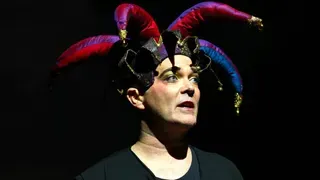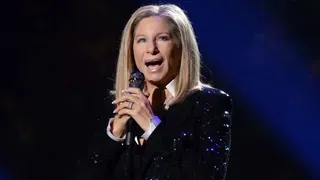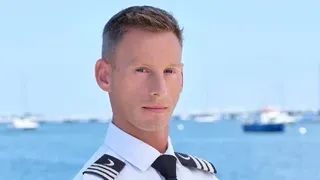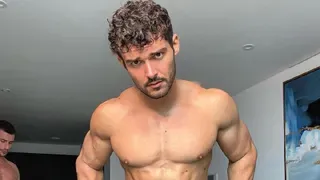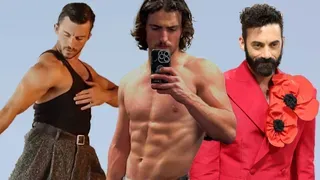March 26, 2011
Dreya Weber Tells A "Marine Story"
Kevin Mark Kline READ TIME: 6 MIN.
Your incredible aerial work has been seen on the stages of concert performers like Pink, Madonna, Carrie Underwood, Britney Spears, Cher...the list goes on and on. When did you first realize you were interested in aerial performances?
I discovered the joy of aerials on the flying trapeze in 1990 and then, over the years, I realized that I could be more expressive with other aerial apparatuses. I could integrate storytelling, dramatic arc...that kind of thing. I really enjoy imagining and designing new environments to play in when I am in the air.
Your company, Anti-Gravity, worked at the Medals Ceremony at the 2002 Winter Olympics in Salt Lake City. We'd love to hear about that event!
I was a founding member of Anti-Gravity in 1991 and I have worked with them many times over the years as a performer, choreographer and associate director. They were asked to create aerials to compliment the opening number at the medals ceremony every night. The audience was 25,000 incredibly enthusiastic people who didn't mind standing shoulder-to-shoulder in the freezing cold.
What were the 2010 Grammy Awards like for you? Pink was outstanding.
I had choreographed that number for the encore performance for Pink's "Funhouse Tour." I dreamed up that apparatus and told her that she was going to get wet at the end of the song. She was quite a sport! That performance was an amazing experience. It was live so it came with all of the risks that go along with that.
Returning to Britney, did you catch her on Glee? Are you a fan of the show?
I never get to watch TV. That sounds crazy...but when I get free time I usually go to the movies!
You produced and starred in the independent feature film The Gymnast. How did that project comeabout?
We had wanted to make a feature film. Ned [Farr] and I had made four short films together - always with the goal of trying to make a feature. We're both completely in love with movies and the process of making movies. He went to film school and I have just always been fascinated with the process. So, we decided to use aerials and the development of an aerial act as a visual anchor for the movie because we knew that it would give a tiny-budgeted independent film a kind of visual esthetic and production value that we couldn't really afford to buy. This was a movie that was made with incredibly limited resources with the money of ourselves and the lead actress and we had to be very smart about what we shot. So, the themes of disappointment of an athlete who defines themselves young by the performance that they are going to be able to achieve and then having a disappointment, not being filled creatively, what is a woman's value when they can't have children, and what does a person do when they find themselves at a point in their life where they no longer feel passion for their relationship, their life, their creativity...and how does one rise to the challenge when one's presented with the opportunity to actually have passion again? Those themes were all very wonderful and interesting to us and Ned wrote a beautiful script. The project kind of stalled and took awhile. When we met Addie when I was doing the Cher tour in 2002, we saw that she would be an incredible asset - not just because of how stunning she is as a performer, an aerialist and an actress, but that she had a kind of richness that would be great for the story because of the kind of person she is.
The Gymnast scored 28 awards around the world in international film festivals. Did you have any idea how successful the film would become?
No, not at all. When you make a feature film about a woman in her 40's starring another woman, both of whom are unknown, you don't really expect to win awards. We were thrilled and I'm so proud of that film and proud that it's an inspiring story about people making a positive choice for their lives and stepping into the unknown toward being a stronger and more complete person. I'm thrilled that that movie has been successful and is getting out into the world.
You were presented with an Outfest Award for Outstanding Actress in a Feature, 2010. How did that recognition feel?
It's humbling to be given an award. I come from the theatre where you're sort of trained that if you believe the good reviews you also have to believe the bad ones, so getting awards is sometimes a tricky proposition. I am very grateful and Outfest has always been so supportive of our projects. So, I am thrilled and honored to have been recognized. I also feel like in that particular role, I wasn't really acting for myself, but for the stories I have read from service people who had been kicked out before and during Don't Ask, Don't Tell. I felt that I had an incredible responsibility to show these service people with honor.
In A Marine Story, you play a Marine discharged under "Don't Ask, Don't Tell." What prompted you to produce this story and take on the role at this critical time in our LGBT civil rights movement?
Ned was inspired to write this story in the years after 9/11 when our military was kicking out its Arabic and Farsi linguists under Don't Ask, Don't Tell at a time when there was an avalanche of information coming in from the middle east that needed to be translated, in theory, so that we wouldn't be attacked again like we were on 9/11. He just thought the absurdity of this issue was astounding. As we researched more and more stories under being discharged under Don't Ask, Don't Tell, we were even more astounded that no one else had told this story. It's an incredibly critical civil rights issue and social issue - I think the most important one of our time. Once we learned more and more about this, we were more and more motivated to tell this story. Ned wrote a beautifully rich screenplay that I was honored to produce and be a part of. I feel like gay and lesbian civil rights are the social issue of my generation and we need to step forward, all of us, and support each other.
Do you know anyone personally affected by DADT?
Several of the women who contributed to our story had to do that anonymously via Twitter and Facebook because they are currently serving marines and because email has been used against service members to build their cases to kick them out under Don't Ask, Don't Tell, they had to be very careful in communicating with us, so, certainly those women have been very affected by this policy. They can't openly serve our county in the way that they would love to. Yes, I do know people that are affected by DADT and I am thrilled that the federal judge recently ruled the law unconstitutional. I hope that Obama does not allow his administration to appeal it and lets the lame duck Congress vote on this and lets this issue die. He needs to stand behind the repeal of this law.
There were some bad-ass moves in A Marine Story. Did you do all of the stunts?
[Laughs]. Yes, I did all the stunts! We did not have a movie where we could afford stunt doubles. I trained for two years getting ready for the fight sequences in A Marine Story - not because I thought I needed to train for two years, but because it took us two years from the time that I started training with a fantastic martial arts specialist named Paul, but because it took us two years to get the movie made. He was incredibly generous in continuing to train with me even though we had no idea at a certain point if the movie was even going to get made. When I told him that I didn't know, he said that it didn't matter and that he was going to keep working with me until we made the movie and that I was ready. He was a critical part of me feeling confident to play a small woman who could kick big man ass [laughs].
What are your thoughts on all of the recent gay teen suicides in America?
Well, it's tragic. If you think back on high school and being a teenager and how horrifying it is when you don't have to deal with homophobia - when you're just dealing with the kind of issues that come up - to have the kind of bullying and bullshit nonsense of ignorance and homophobia on top of it is a nightmare that is hard to imagine. We need to work really, really hard and everybody needs to be behind being responsible adults and letting teenagers know that we won't allow that kind of bullying. That we won't allow the development of hate crimes. That we won't allow children to be driven into despair so that they feel that the only option is to commit suicide. It's horrifying beyond imagination. Everybody needs to have awareness and be active in making sure that we speak about it and support it. Our high school teachers need to speak about it and take responsibility to educate the children and teach mutual support of each other regardless of our life choices.
A Marine Story is on DVD now


